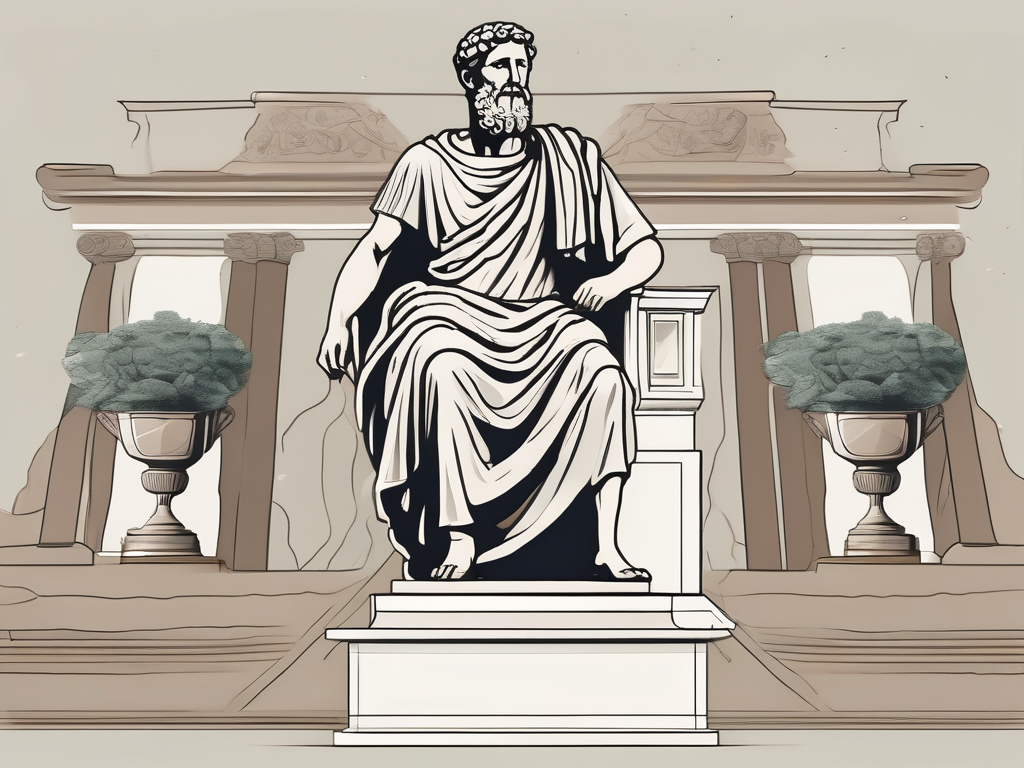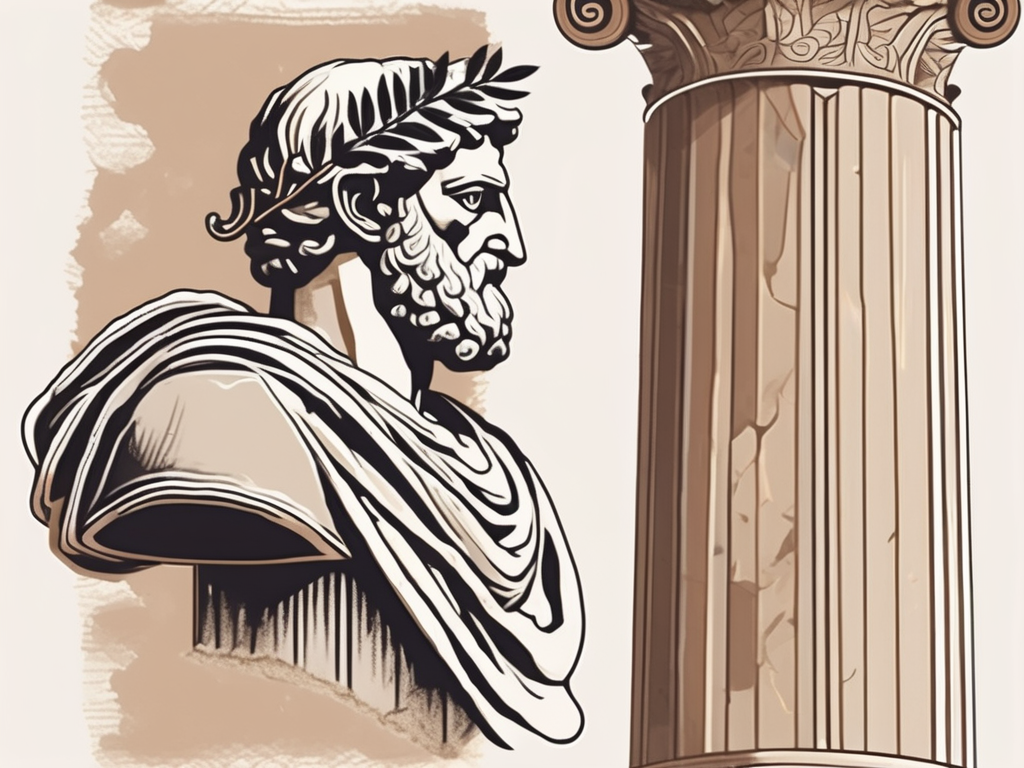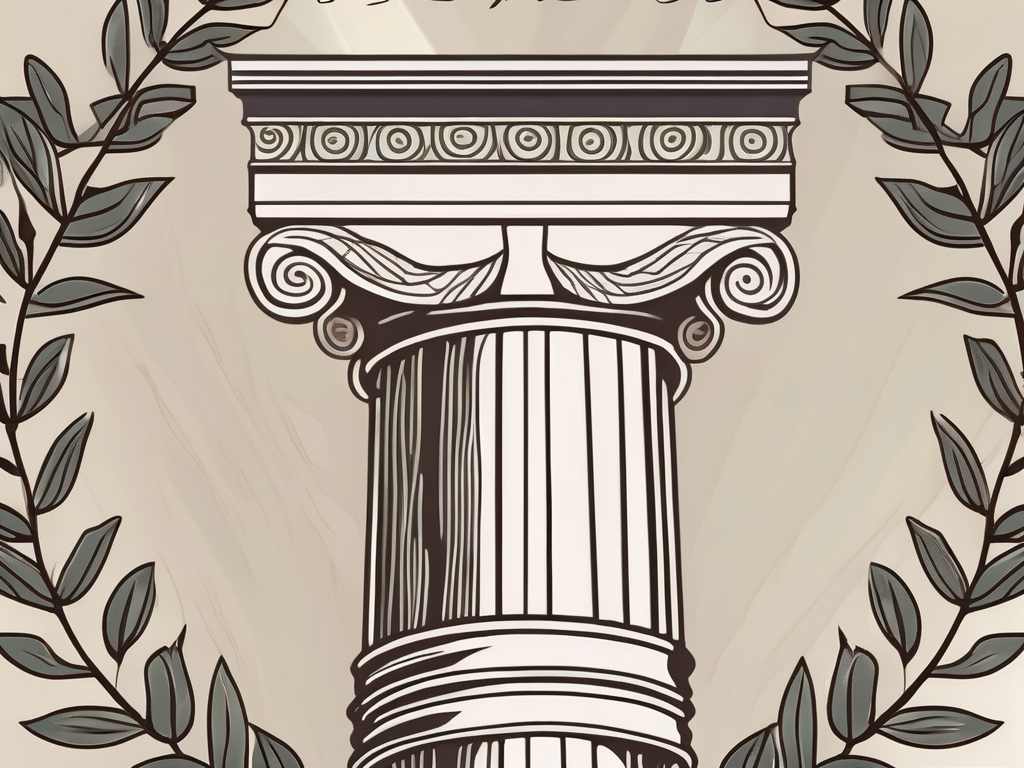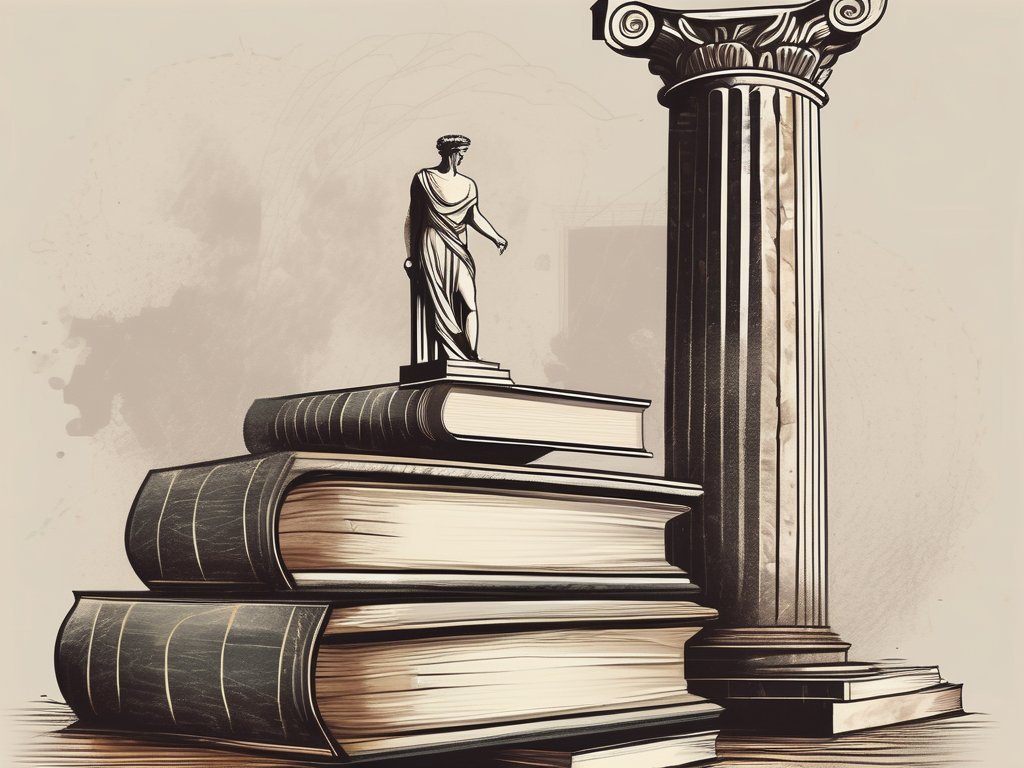Stoicism is a philosophy that has stood the test of time, providing individuals with insights and guidance on how to navigate the complexities of life. One of the most famous proponents of this philosophy was Marcus Aurelius, a Roman emperor and philosopher who left behind a remarkable book called “Meditations.” In this article, we will delve into the philosophy of stoicism, explore the life and legacy of Marcus Aurelius, and uncover the enduring relevance of his wisdom in today’s world.
Understanding the Philosophy of Stoicism
At its core, stoicism is a philosophy that emphasizes the importance of virtue and inner tranquility as the key to a good life. Stoics believe that while we cannot control external circumstances, we have complete control over our reactions and attitudes towards them. By cultivating a rational and disciplined mindset, one can maintain equanimity and achieve a state of eudaimonia, or a flourishing life.
Stoicism traces its roots back to ancient Greece, where it was developed by philosophers such as Zeno of Citium and Epictetus. It gained popularity in Rome, with prominent stoic thinkers like Seneca and Marcus Aurelius. The philosophy continues to influence modern thought, with its principles finding resonance in various aspects of life.
One of the fundamental principles of stoicism is the dichotomy of control, which distinguishes between things that are within our power to control, such as our thoughts and actions, and things that are outside of our control, such as other people’s opinions or the weather. By focusing our energy on what we can control and accepting what we cannot, stoics aim to free themselves from unnecessary worries and attachment to external outcomes.
The Core Principles of Stoicism
Stoicism is built upon a foundation of key principles that guide its practitioners:
- Wisdom: The pursuit of knowledge and the constant practice of self-reflection. Stoics believe that by continuously seeking wisdom, one can gain a deeper understanding of the world and oneself.
- Courage: Facing challenges and adversities with resilience and a steadfast spirit. Stoics recognize that life is filled with obstacles, and it is through courage that they can confront and overcome these challenges.
- Justice: Treating others fairly and contributing to the greater good of society. Stoics believe in the importance of ethical behavior and the responsibility to create a just and harmonious society.
- Temperance: Practicing self-control and moderation in all aspects of life. Stoics advocate for avoiding excess and finding balance in one’s desires and actions.
These core principles serve as a compass for stoics, guiding their thoughts, actions, and interactions with the world.
Stoicism and Modern Life
While stoicism originated thousands of years ago, its principles resonate strongly with the challenges of modern life. In today’s fast-paced and uncertain world, stoicism offers valuable tools to navigate the complexities and maintain inner peace.
One way stoicism intersects with modern life is through its emphasis on detachment from material possessions and external validation. In a society that often values material wealth and social status, stoicism reminds us that true happiness and fulfillment come from within, rather than relying on external markers of success. By focusing on cultivating virtues and inner tranquility, stoics find contentment regardless of their external circumstances.
Additionally, stoicism encourages individuals to embrace obstacles and setbacks as opportunities for growth. In a world where setbacks are inevitable, the stoic mindset helps us view these challenges as valuable learning experiences, allowing us to develop resilience and strength. Stoics believe that by accepting and embracing adversity, we can transform it into a catalyst for personal growth and self-improvement.
Furthermore, stoicism promotes the practice of mindfulness and being present in the moment. In an age of constant distraction and information overload, stoics remind us of the importance of being fully engaged in the present moment. By focusing on the here and now, stoics find clarity, peace, and a deeper appreciation for life’s simple pleasures.
In conclusion, stoicism offers a timeless philosophy that provides guidance and solace in the face of life’s challenges. Its principles of virtue, inner tranquility, and acceptance of what is within our control resonate strongly with the complexities of modern life. By embracing stoic teachings, individuals can cultivate a mindset that leads to personal growth, resilience, and a flourishing life.
The Life and Legacy of Marcus Aurelius
In the pantheon of stoic thinkers, Marcus Aurelius holds a special place as both a philosopher and a ruler. Born in 121 AD, he became the emperor of Rome in 161 AD. As a stoic philosopher, Marcus Aurelius upheld the principles of the philosophy in his personal and political life, focusing on wisdom, virtue, and duty.
But who was Marcus Aurelius beyond his role as emperor? What were the experiences and beliefs that shaped him into the philosopher king he is remembered as today?
From a young age, Marcus Aurelius displayed a keen intellect and a thirst for knowledge. He studied under the tutelage of renowned philosophers, immersing himself in the teachings of Stoicism. This early exposure to philosophy laid the foundation for his later writings and actions.
Marcus Aurelius: The Philosopher King
Marcus Aurelius believed in leading by example and governing with virtue. Despite the pressures of ruling a vast empire, he remained steadfast in his commitment to the stoic philosophy. His reign is often remembered as a time of relative peace and prosperity, during which the welfare of the citizens was a top priority.
But what did it mean for Marcus Aurelius to govern with virtue? It meant making decisions that were guided by reason and moral principles, rather than personal gain or power. It meant treating his subjects with fairness and compassion, striving to create a just society for all.
What sets Marcus Aurelius apart is his unwavering dedication to self-improvement and self-examination. In his book “Meditations,” he documented his inner dialogue, providing insights into his thoughts and struggles. This intimate glimpse into his mind allows us to connect with Marcus Aurelius on a profoundly human level.
Within the pages of “Meditations,” Marcus Aurelius grapples with the complexities of life and the challenges of leadership. He reflects on the transience of power and the fleeting nature of fame, reminding himself to remain humble and grounded. He contemplates the nature of virtue and the importance of living in accordance with one’s principles.
Through his writings, Marcus Aurelius invites us to embark on our own journey of self-discovery and introspection. He encourages us to question our beliefs, to examine our actions, and to strive for personal growth.
The Influence of Marcus Aurelius on Stoicism
Marcus Aurelius’ “Meditations” has become a cornerstone of stoic literature, influencing countless individuals throughout the centuries. The book compiles his personal reflections and philosophical musings, offering guidance on how to live a virtuous and meaningful life.
One of the central themes of “Meditations” is the impermanence of life and the importance of seizing the present moment. Marcus Aurelius reminds readers to focus on what is within their control, to be mindful of their actions, and to confront challenges with courage and grace.
But the impact of Marcus Aurelius extends beyond the pages of his own writings. His ideas and principles have shaped the course of history, inspiring generations of thinkers, leaders, and individuals seeking a deeper understanding of themselves and the world around them.
Today, the legacy of Marcus Aurelius lives on, reminding us of the enduring power of philosophy and the potential for personal transformation. His teachings continue to resonate with those who strive to live a life of wisdom, virtue, and duty.
Diving into ‘Meditations’: Aurelius’ Magnum Opus
“Meditations” is a profound work that encapsulates the essence of stoicism. Through a series of aphorisms and reflections, Marcus Aurelius provides practical wisdom and actionable advice for individuals seeking to live a stoic life.
As we delve into the depths of “Meditations,” we are transported to a world where stoic philosophy reigns supreme. Marcus Aurelius, the Roman Emperor and philosopher, invites us to explore the intricacies of our own existence and discover the profound truths that lie within.
With each turn of the page, we are confronted with the central themes that permeate this magnum opus. One such theme is the idea of accepting the natural order of the universe. Marcus Aurelius urges readers to embrace the ebb and flow of life, recognizing that everything happens for a reason and that change is an inherent part of existence.
Through his words, we are reminded that life is a constant dance between joy and sorrow, success and failure, and that it is our duty to gracefully accept these fluctuations. By surrendering to the natural order of things, we free ourselves from the burden of resistance and find solace in the harmony of the universe.
Another theme that resonates throughout “Meditations” is the power of mindfulness and self-reflection. Marcus Aurelius encourages readers to engage in daily introspection, examining their thoughts and actions to ensure they align with their values and principles.
He reminds us that true wisdom lies not in the accumulation of knowledge, but in the deep understanding of oneself. By turning our gaze inward, we gain insight into the workings of our own minds and uncover the hidden motivations that drive our actions. Through this process of self-reflection, we are able to cultivate a sense of self-awareness that guides us towards a more virtuous and meaningful life.
The Stoic Teachings in ‘Meditations’
“Meditations” serves as a practical guide for applying stoic principles in everyday life. Marcus Aurelius emphasizes the importance of resilience in the face of adversity, reminding readers that challenges are opportunities for growth.
He implores us to view setbacks not as obstacles, but as stepping stones on the path to self-improvement. By embracing the difficulties that come our way, we develop the strength and fortitude necessary to overcome any obstacle that life throws at us.
Furthermore, “Meditations” highlights the significance of gratitude, reminding readers to appreciate the present moment and find joy in the simple pleasures of life. Marcus Aurelius advises readers to maintain an attitude of gratitude, recognizing the beauty and blessings that surround them.
He reminds us that even in the face of adversity, there is always something to be grateful for. By shifting our focus from what we lack to what we have, we cultivate a sense of contentment and find solace in the present moment.
As we immerse ourselves in the teachings of “Meditations,” we are confronted with the profound wisdom of Marcus Aurelius. His words serve as a guiding light, illuminating the path towards a stoic life. Through acceptance, mindfulness, resilience, and gratitude, we are empowered to navigate the complexities of existence with grace and wisdom.
The Relevance of Stoicism Today
Stoicism continues to hold significant relevance in today’s society, providing individuals with timeless guidance on how to navigate the complexities of life.
Applying Stoic Principles in Everyday Life
Stoicism offers practical tools for managing stress, cultivating resilience, and finding inner peace. By focusing on what we can control and letting go of attachment to external outcomes, we can navigate the challenges of modern life with greater clarity and equanimity.
Additionally, stoicism encourages individuals to live in accordance with their values and to prioritize virtue above all else. By aligning our actions with our principles, we can lead a meaningful and purposeful life.
The Impact of Stoicism on Modern Psychology
Stoicism has also influenced modern psychology, particularly in the areas of cognitive-behavioral therapy (CBT) and positive psychology. CBT incorporates stoic principles to help individuals reshape their thoughts and develop healthier behavioral patterns. Positive psychology focuses on cultivating virtues such as wisdom, courage, and temperance, aligning with the core principles of stoicism.
The Enduring Appeal of Marcus Aurelius’ Wisdom
Despite the passage of time, the wisdom imparted by Marcus Aurelius in “Meditations” continues to resonate with readers across generations.
Why ‘Meditations’ Resonates with Readers Today
The timeless nature of “Meditations” lies in its universal themes and relatable insights. Marcus Aurelius’ musings on resilience, gratitude, and self-reflection touch upon the fundamental human experience, offering guidance and solace to individuals navigating their own journeys.
The Timeless Lessons from Marcus Aurelius’ Stoicism
Marcus Aurelius’ stoicism reminds us of the power and resilience of the human spirit. His lessons on embracing challenges, finding contentment within oneself, and living a life of virtue continue to inspire individuals seeking wisdom and meaning in their own lives.
In conclusion, the philosophy of stoicism, as exemplified by Marcus Aurelius’ book “Meditations,” offers timeless wisdom that can be applied to navigate the complexities of modern life. By embracing stoic principles, cultivating resilience, and living in alignment with virtues, individuals can find inner tranquility and lead meaningful lives. The enduring relevance of stoicism confirms its status as a philosophy that transcends time and speaks to the universal human experience.












